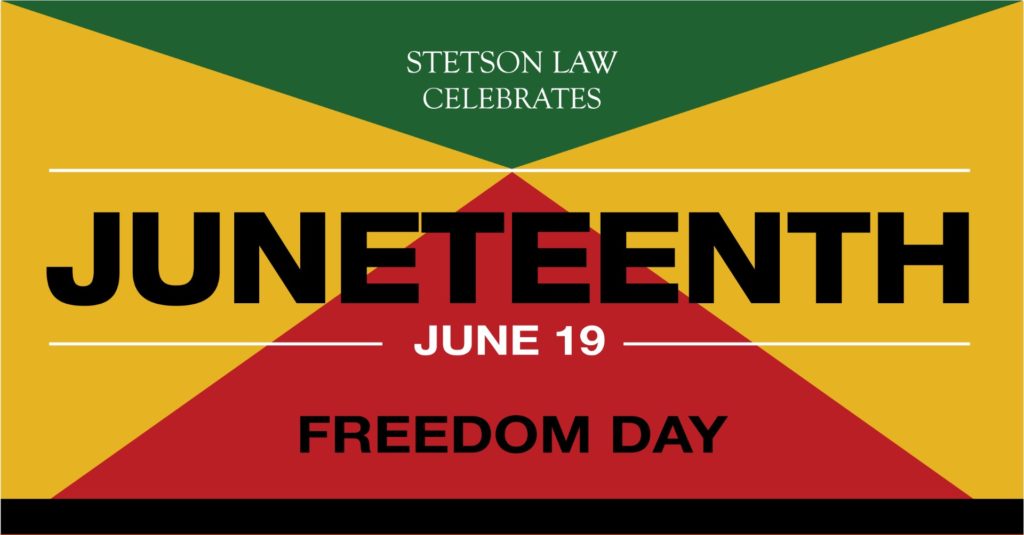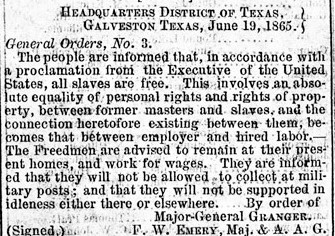Exploring Juneteenth: Local Events, Resources & More

Officially a federal holiday in the United States since 2021, Juneteenth is synonymous with freedom. The day commemorates the date enslaved Black people in Texas were informed of the Emancipation Proclamation – albeit nearly two years after its enactment.
Marking the official end to legal enslavement – and celebrating those who fought hard for freedom – has taken many forms throughout the United States. Juneteenth, June 19th of every year, represents a uniform recognition and celebration of that pivotal moment in our history.
Below is a brief summary of the historical facts, but you can learn even more by consulting the links listed below or exploring the numerous resources catalogued in libraries across the United States.
History of Juneteenth
With this formal announcement of the end of slavery in Texas, June 19th quickly became the symbolic commemoration and celebration day for African Americans. Emancipation Day celebrations already had a history—African Americans in New York had been celebrating July 5th since the end of slavery there in 1827, and Black residents of Washington, D.C., gathered on April 15, 1866, to honor freedom. But in the decades following the war, Juneteenth became the focal date for African American communities to memorialize liberation across the country.

On June 19, 1865, Gen. Gordon Granger arrived with the Union Army in Galveston, Texas, and issued General Order No. 3 announcing the enforcement of President Lincoln’s Emancipation Proclamation (which had been issued more than two years earlier on Jan. 1, 1863) and ending slavery in Texas. Even though the Confederate army had surrendered at Appomattox in April, the war persisted in more remote places across the south and southwest, and it took the arrival of the Union troops and northern control of land and government to enforce liberation in many of those areas.

African American churches helped raise money to buy land and create Emancipation Park in Houston in 1872 for a location to hold these celebrations. Juneteenth became a traditional African American holiday in Texas and also nationally, celebrated with speeches, music, and parades. These celebrations remained community-led, however, because prior to 1979, neither states nor the federal government officially recognized a day celebrating the dramatic achievement of emancipation.
Eventually, in 1979, Texas passed a bill introduced by State Rep. Al Edwards recognizing Juneteenth as a state holiday – the first state to do so. Since then, 45 states have recognized Juneteenth as a holiday or day of observance (Florida did so in 1991).
Juneteenth was made a federal holiday in 2021 and was added to the Stetson University holiday calendar in 2022.
Stetson Law takes part in racial justice initiatives

As a legal education institution that takes its role of advocating for justice seriously, Stetson Law has partnered with community organizations that do important work for underrepresented populations.
One such initiative is the St. Petersburg Truth, Racial Healing, and Transformation Center (TRHT), a partnership with Eckerd College that aims to leverage local resources in a manner that will ultimately enrich the communities that need it most with economic opportunities, greater health outcomes, and more.
Learn more about St. Petersburg TRHT.
Local events celebrating Juneteenth in 2024
Stetson’s Black Law Students Association will be holding an event on Wednesday, June 19 from 4:00 to 6:00 P.M. at War Veterans’ Memorial Park at 9600 Bay Pines Boulevard in St. Pete. More details here.
Numerous other organizations are holding events to celebrate Juneteenth throughout the Tampa Bay region. Here are a few:
A Juneteenth Kickoff Mixer at St. Pete Youth Farm on Friday from 7:00 to 9:00 P.M.
Gulfport’s Celebrate Juneteenth Event from 10:00 A.M. to 1:00 P.M. Saturday, June 15 at Gulfport Casino.
R.O.C. the Block Juneteenth Festival, Raymond James Stadium, Tampa (June 15)
The Phyllis Wheatley Rise to Read Campaign Juneteenth Gospel Fest at 2901 54th Avenue South on Sunday, June 16 from 4:00 to 6:00 P.M. St. Petersburg College’s Juneteenth Celebration from 11:00 A.M. to 2:00 P.M. June 18 in the Health Education Center Lobby on their campus at 7200 66th St. N. in Pinellas Park.
See more Juneteenth events via WUSF.
For further reading
- Library of Congress https://blogs.loc.gov/loc/2015/06/celebrating-juneteenth/
- National Museum of African American History https://nmaahc.si.edu/blog-post/celebrating-juneteenth)
- Congressional Research Service Juneteenth Fact Sheet https://fas.org/sgp/crs/misc/R44865.pdf
- Juneteenth: An American History through Maps https://www.arcgis.com/apps/MapJournal/index.html?appid=bca22b61a4dd47ce97f2f67c5d24ceed
- “So You Want to Learn About Juneteenth,” New York Times, June 16, 2020 https://www.nytimes.com/article/juneteenth-day-celebration.html
- Janice Hume and Noah Arceneaux, “Public Memory, Cultural Legacy, and Press Coverage of the Juneteenth Revival”, 34 Journalism History 155 (Fall 2008).
- William H. Wiggins Jr., O Freedom: Afro-American Emancipation Celebrations (1987)
Special thanks to Professor James W. Fox Jr. for compiling this brief history on Juneteenth, the resources list, and photographs.
Post date: June 19, 2020
Media contact: Kate Bradshaw
[email protected] | 727-430-1580